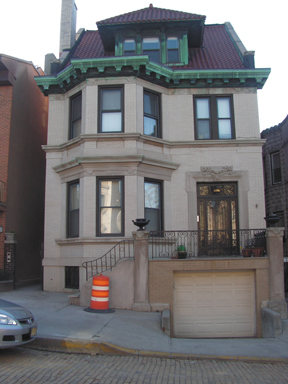An ongoing Zoning Board hearing on the validity of a former city official’s already-completed home expansion will wrap up on April 2 after final arguments are heard from attorneys on both sides of the issue.
Former Hoboken Tax Collector Louis Picardo’s neighbors have objected to the fact that the addition to his home on Castle Point Terrace was constructed without correct zoning approvals, a situation that was later determined by the board to be the fault of an interim zoning inspector.
The most recent in a series of hearings on the property was held this past Tuesday, and the board has been considering whether Picardo can be granted a zoning variance retroactively. If not, Picardo may be asked to remove the addition or provide some other remedy.
The timeline
Picardo was granted a construction permit by the city last year to expand the top floor of his house at 920 Castle Point Terrace.
In a previous hearing, the Zoning Board found that interim Zoning Official Virginia Buonfiglio made a mistake when she granted Picardo permits for his construction without sending him before the board for a zoning variance. A variance is an official vote to allow him to deviate from existing zoning guidelines.
To compound the error, Construction Code Official Al Arrezzo also signed off on the expansion,officials said.
The board decided in a 4-2 vote on April 15, 2008 that the structure was non-conforming and in fact needs a variance.
The Castle Point Terrace area, adjacent to Elysian Park, has restrictions on façade changes, heights, and density that are designed to preserve the character of the neighborhood.
The board can allow Picardo’s project to deviate from certain zoning rules if he can prove the project provides a benefit – or a lack of detriment – to the city.
Neighbors noticed and asked questions
When neighbors saw the construction in February of 2008, they began asking why Picardo had been allowed to build without a zoning hearing. Neighbors are always notified when the board schedules a hearing for an application.
Julian and Gretchen Brigden, neighbors whose home is directly behind Picardo’s, say they were never notified and were not given sufficient answer from the city as to why the project was continuing.
The Brigdens filed a court complaint on Feb. 19, 2008. Superior Court Judge Maurice G. Gallipoli sent the case to the Zoning Board for immediate consideration on whether the permits should have been granted. Gallipoli also told Picardo that continuing construction without further approval could leave him at risk of having to tear down the renovations later.
After Gallipoli sent the case to the Zoning Board, the board agreed that the permits were not valid and that a hearing on the variances would be necessary. Only Board Chairman Dominic Lisa and board member Randall Underwood voted to allow the permits to stand.
During a hearing earlier this year, both Lisa and Underwood came under questioning by another board member about possible conflicts of interest since both men had their tax returns prepared by Picardo’s firm.
Board Attorney Doug Bern allowed each member to decide for himself whether he had a conflict or not. Both members must make their decision before the vote at the next meeting.
Retroactive variances?
The board met until past midnight on Tuesday to hear final testimony and public comments, but since only five members of the nine-member board were present – and applicants for major variances need five affirmative votes – the board postponed the vote until a special meeting on April 2.
If the board rules against Picardo, the expansion will have to be torn down.
________
If the board rules against Picardo, the expansion will have to be torn down. If not, Picardo has approval to allow the structure to remain.
Some board members believe the case will be appealed before a court no matter what the outcome.
Five units?
Jeffrey Kantowitz, attorney for the objectors, pointed out Tuesday night that the board should have heard testimony from Picardo himself, since he signed the application for the variance request. On the application, Picardo claimed there are five units in his house – his dwelling space and four apartments – but Kantowitz said he was unable to find any certificates of occupancy for the apartments filed in the construction code office. The city only had three units on record, until a city tax assessor revisited the home last October when it became apparent that the building needed a reassessment.
Without certificates of occupancy, Picardo’s home may not legally hold five units, and Kantowitz believes that an approval of the variances would automatically legalize these units.
Picardo declined to comment on the hearing and on this issues when contacted on Thursday, only to say that his presence was not necessary.
Last week, Lisa said Picardo won’t be appearing at the next meeting for testimony, despite the objectors’ requests. Lisa said it’s too late and all the testimony has been heard.
“There’s no way he can come now,” Lisa said.
Timothy J. Carroll may be reached at tcarroll@hudsonreporter.com.
